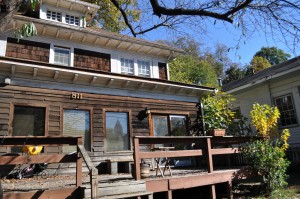When you buy a home, you will learn that there are two kinds of mortgages: fixed-rate and adjustable-rate.
What’s the difference?
A fixed-rate mortgage gives you an interest rate that never changes. An adjustable-rate mortgage gives you a volatile interest rate: in times of slow economic growth and low inflation, the interest rate will be low; in times of high economic growth and inflation, the interest rate will rise.
Why do some people like adjustable-rate mortgages?
Advocates of adjustable-rate mortgages argue that these give you a shot at getting lower rates than you can ever get with a fixed-rate. In late 2010, when the average fixed-rate mortgage was 4.5 percent, I overheard a guy sitting at the table next to me at a sushi restaurant bragging to his dinner companions about his brand-new, adjustable-rate 3.25 percent mortgage.
It’s true that he’s getting a lower rate than those with fixed-rate mortgages … for now.
You can’t predict the future.
But what’s going to happen in 3 years, 5 years, even 10 years, when interest rates rise and this guy’s 3.25 percent rises to a whopping 6 percent or 7 percent?
Advocates for adjustable-rate mortgages argue two points:
#1: You never know which type of mortgage will end up being cheaper in the end – why not keep open the possibility of a cheaper mortgage?
Of course, that swings both ways. An adjustable-rate mortgage might be cheaper OR more expensive down the road. There’s no way to know. Why take on the added risk and uncertainty?
#2: Paying 7 percent in 10 years — when you owes less on your mortgage — is better than paying 4.5 percent now, when you carry the heaviest loan on your mortgage. In other words, it’s better to owe a low interest rate on a big debt, and a high interest rate on a small debt.
Riiiight. Sounds great in theory. Except for one pesky little point:
Don’t assume that 5 years, 10 years, or 15 years down the road, when mortgage rates rise, you’ll be able to handle the extra payments.
Let’s say you’re paying $700 a month on your mortgage right now.
Four years later, you and your spouse accidentally get pregnant. With twins! Congratulations! Looks like one of you will become a stay-at-home parent.
The following year, your brother gets sick. You take two months’ unpaid leave to care of him.
Then your furnace breaks down. Your engine explodes. A storm blows a heavy tree limb onto your roof.
Gas prices have climbed to $6.50 a gallon. You need eyeglasses. And – guess what? – your mortgage has skyrocketed to $1,200 per month.
Can you afford it? More importantly — can you say, with absolute certainty, that you are SO SURE you’ll be able to afford any mortgage bill, no matter how high it climbs, at any time over the next 30 years?
“If it gets too high, I’ll refinance,” you retort.
In other words, you’ll put your family’s fate in the hands of a mortgage underwriter. Nice plan, dude.
What makes you so sure that you can refinance? What if you accidentally miss a bill, and your credit gets dinged? What if banks institute even-tougher lending policies? What then?
Are you willing to take this incredible gamble … knowing that if you lose this gamble, you’ll lose your home?

